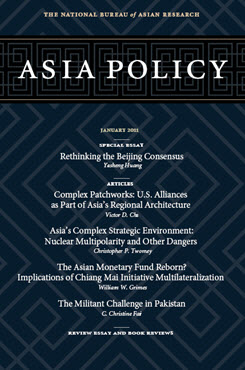Asia's Complex Strategic Environment
Nuclear Multipolarity and Other Dangers
This article evaluates the implications of nuclear multipolarity and strategic complexity in Asia.
EXECUTIVE SUMMARY
MAIN ARGUMENT
Ongoing changes in traditional state-to-state nuclear dynamics are reshaping international security in Asia. Today, Asia is a multipolar nuclear environment in which long-range nuclear weapons are joined by other systems with strategic effect, and in which countries hold different views about the role and utility of nuclear weapons. This article discusses the implications of these shifts from the Cold War to the present for several guises of stability, on the one hand, and for competition and conflict, on the other. Though each of these considerations leads to dangerous outcomes in isolation, their combined effect is even more deleterious. The implications of this analysis are deeply pessimistic, both for peace in general and for U.S. national security interests in particular.
POLICY IMPLICATIONS
- Asia is likely to see vigorous competition in the strategic arena, ranging from increased offensive nuclear weapons to the development of advanced conventional offensive munitions and missile defenses. These technologies will likely continue to spread.
- Competition between Asian states is likely to lead to increased reliance on nuclear threats, bluster, and statecraft. This will erode any “nuclear taboo” and will increase the chance of nuclear weapons detonation.
- Arms control is unlikely to substantially mitigate any of these concerns in the current environment.
- Given the pessimistic factors outlined above, increased understanding across states of how each sees the utility of nuclear weapons will be extremely beneficial.
- Missile defenses systems make, on balance, a positive contribution to regional security; nevertheless, their negative implications should be addressed through judicious use of transparency about nontechnical aspects of the systems.
- Expansive national security goals such as regime change should be abandoned, given the potential for catastrophic nuclear escalation.
About Asia Policy
Asia Policy is a peer-reviewed scholarly journal presenting policy-relevant academic research on the Asia-Pacific that draws clear and concise conclusions useful to today’s policymakers. Asia Policy is published quarterly in January, April, July, and October and accepts submissions on a rolling basis. Learn more


